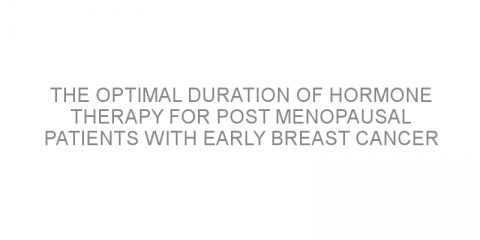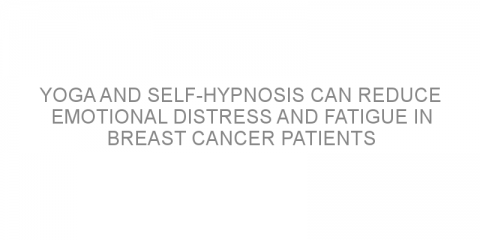In a nutshell This study aimed to evaluate post-traumatic stress disorder (PTSD) in patients who have had treatment for cancer. This study found that a number of patients undergoing cancer treatment developed PTSD after treatment and recommended that supports are put in place. Some background Post-traumatic stress disorder (PTSD) is a...
Read MoreBreast cancer Posts on Medivizor
Emergencies and Illness
After three hurricanes, flooding, fires and mudslides, and now severe cold and snow in the Deep South and throughout the country, the US has had its share of emergencies. Are you prepared? For people who rely on oxygen, who are on dialysis, have diabetes or other serious conditions, it is time to think about putting together some of the essentials. What...
Read MoreThe optimal duration of hormone therapy for post menopausal patients with early breast cancer
In a nutshell This study aimed to compare the benefits of taking letrozole for 2.5 years versus 5 years in post-menopausal patients with early stage breast cancer. This study found no benefit of five years extended therapy with letrozole compared to 2.5 years, after an initial five years of hormone therapy. Some background Breast...
Read MoreCAR T-Cells and HIV: What’s the Connection?
It has taken decades of work for researchers to find ways to activate the immune system to treat cancer (what we now call immuno-oncology or I-O). Much of that work has been poorly funded. Largely, it has been the result of researchers getting experience in other disciplines (like infectious disease) and then transferring that expertise to oncology...
Read MoreThe biosimilar filgrastim is effective at preventing fever during chemotherapy for breast cancer
In a nutshell This study evaluated the effectiveness of filgrastim (Neupogen) as compared to original G-CSF treatments lenograstim and pegfilgrastim (Neulasta). The study concluded that filgrastim was as effective as original G-CSF treatments. Some background Low white blood cell counts can occur...
Read MoreEndocrine therapy and targeted therapy are safe for patients over 65 with HR+/HER2- advanced breast cancer
In a nutshell This study aimed to evaluate the effectiveness and safety of endocrine therapy, with or without targeted therapy, for patients with advanced metastatic breast cancer. This study concluded that the use of endocrine therapy and targeted therapy is safe for use in patients over 65. Some background There are several treatment...
Read MoreRibociclib with letrozole vs letrozole alone in elderly patients with hormone receptor-positive, HER2-negative breast cancer
In a nutshell This study aimed to determine the effectiveness and safety of ribociclib (Kisqali) combined with a non-steroidal aromatase inhibitor in elderly patients with hormone receptor positive and HER-2 negative breast cancer. This study concluded that ribociclib improved progression free survival and was relatively safe to use...
Read MoreLong-term outcomes of dose-dense chemotherapy for high-risk breast cancer
In a nutshell This study aimed to compare intense dose-dense adjuvant (after surgery) chemotherapy with conventionally scheduled chemotherapy. This study concluded that the dose-dense chemotherapy regime had a better 10-year survival and event free survival rates as compared to conventional chemotherapy. Some background Breast cancer...
Read MorePTSD and Cancer
“I think all too often we underestimate the impact of a cancer diagnosis on the mental health and well-being of the individual, thus it goes unaddressed.” ~Stephanie Zimmerman, MSN Receiving a diagnosis of cancer can bring on feelings of worry, fear, dread, anger, uncertainty and loss. Research indicates that, for some people, these symptoms of...
Read MoreDelays in radiotherapy and recurrence in patients with ductal carcinoma in situ
In a nutshell This study aimed to investigate the association between ipsilateral breast tumor recurrence (IBTR) and the timing of radiotherapy. This study found that a delay of more than 12 weeks in starting radiotherapy was associated with a higher risk of IBTR in women undergoing BCS for ductal carcinoma in situ. Some background Breast...
Read MoreYoga and self-hypnosis can reduce emotional distress and fatigue in breast cancer patients
In a nutshell This study aimed to compare the effectiveness of cognitive behavioral therapy (CBT), yoga, and self-hypnosis as psychological interventions for breast cancer patients. This study found that mind-body therapies are an effective approach. Some background There are many side effects that can be associated with cancer diagnosis and...
Read MoreDuctal carcinoma in situ and surgery: What type is best?
In a nutshell This study aimed to identify rates of contralateral breast cancer (CBC) and ipsilateral breast tumor recurrence (IBTR) after breast conserving surgery (BCS). This study found that rates of CBC were low and the risk of CBC was not associated with age, family history, presentation, year of surgery or radiation. Some background...
Read More











